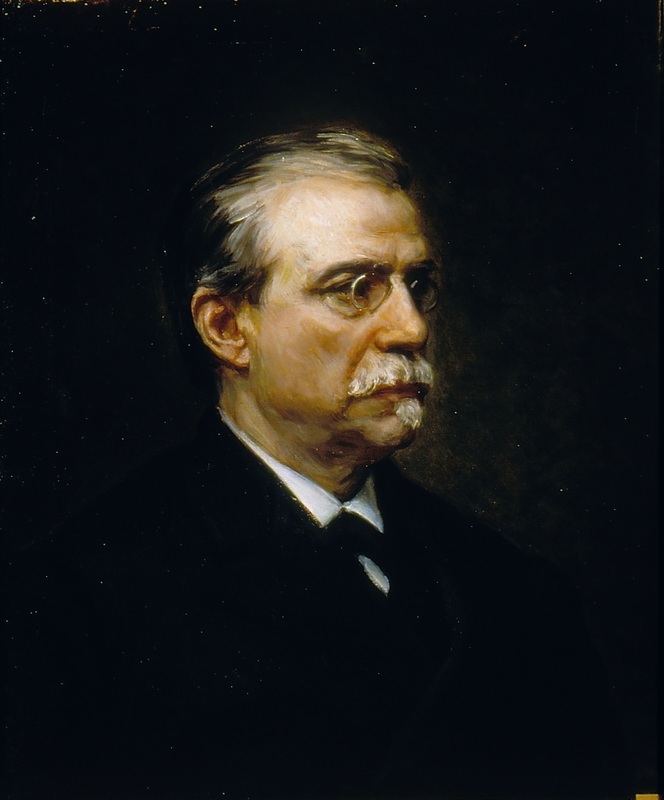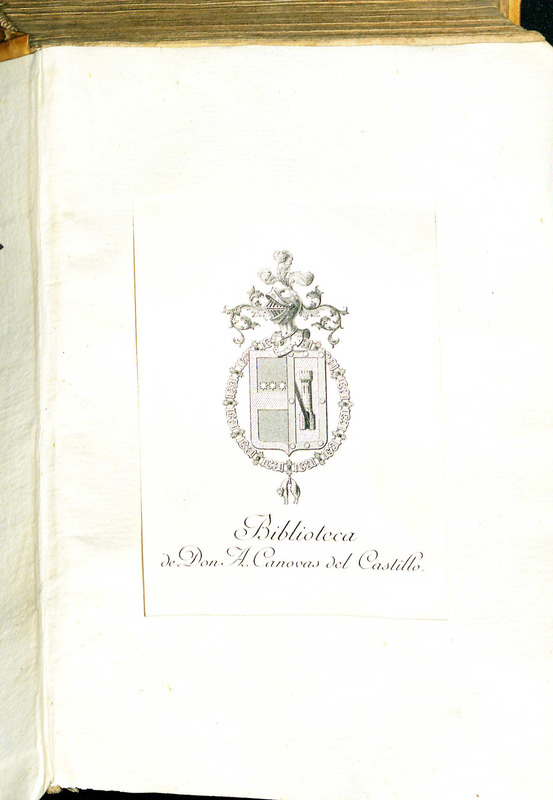Antonio Cánovas del Castillo and the Haverford Quijote Copies
Haverford Special Collections houses a pair of rare literary treasures: copies of the first and second parts of Cervantes’ El Ingenioso Hidalgo don Quijote de la Mancha. Documentation gives us background as to the previous ownership of these rare books, and one particularly notable owner was the historian and politician Don Antonio Cánovas del Castillo. Cánovas lived in Spain from 1828 to 1897 and wielded a heavy influence over Spanish politics and intellectual discourse of the time from his many positions of leadership. These powerful roles included six terms as Spanish Prime Minister, governor of Cádiz, diplomatic representative to Rome, and even temporarily as Head of State after the death of King Alfonso XII in 1885, while Alfonso's wife, Maria Cristina, was regent.
Cánovas was part of Spain’s Conservative Party, and during his years in power he was against both freedom of religion and universal suffrage. He was given significant influence over the formation of the 1876 Spanish Constitution, which established a constitutional monarchy in place of the previous Republic, and restricted suffrage in a manner that particularly affected the working class. He also contributed to the creation of a system of political manipulation which assured the regular rotation of power between liberal and conservative parties. His international relations had destabilizing effects for Spain, particularly with respect to maintaining power over the colony of Cuba. Eventually Cánovas was assassinated in 1897 by an Italian anarchist.
As well as being a politician, Cánovas was a well-educated and cultured intellectual, with a wide range of interests. He studied law at the University of Madrid, and this education aided him greatly in politics. He also studied history and gained scholarly renown with his historical study Historia de la decadencia de España. At only 32 he was elected to the Real Academia de la Historia (Royal Academy of History), and he was later elected to the Royal Academy of Fine Arts, the Royal Academy of Moral Sciences and Politics, and the Royal Academy of Spain. His insight was crucial to the 1854 and 1874 coups; for both he wrote manifestos which were successful in gaining supporters and elaborating political aims.
Given Cánovas’ intellectual prowess, one would expect his library to be stocked with rare classics, so perhaps the inclusion of the first editions of Don Quijote is unsurprising. However, Cervantes’ masterpiece is often interpreted as a progressive novel, including ‘proto-feminist’ portrayals of women, subtle critiques of the class hierarchy and a definite lack of religious fervor: Don Quijote is excommunicated from the Catholic church before the first part ends. Don Quijote is a liberator and a champion for good—“the Knight-Errant makes it clear that his duty binds him to protect the weak, relieve the oppressed, and punish the bad”—his progressive characterization is somewhat out of alignment with Cánovas’ more conservative and repressive policies (Balseiro 645). Don Quijote may not have been the best fit for Cánovas’ personal enjoyment; nevertheless, Don Quijote has gained national significance beyond being simply an enjoyable novel in the four centuries since its creation. Miguel de Unamuno (1864–1936), a well renowned scholar of Cervantes, stated: “By now Don Quijote belongs to everyone, to each one of its readers… everyone can and should interpret it mystically, so to speak, in the same way that the Bible is usually interpreted” (3). Indeed, endless perspectives are applied to Don Quijote; it has been subject to an enormous variety of often-conflicting interpretations by literary scholars, and adapted into many new forms through various media internationally. Statesmen with a political agenda, such as Cánovas, may seek to interpret this complex national symbol to fit their own rhetoric. By reading selectively to avoid the societal critiques which might work against his politics and emphasizing nationalist themes, such as Don Quijote’s romanticized imagining of Spain as a country with a proud history of brave deeds and noble figures, in which honor and virtue are upheld, Cánovas could have used this multi-faceted novel as a source of support. Don Quijote holds cultural pride for Spaniards in its designation as the first modern novel; its worldwide renown and representation of Spanish history and culture contribute to a sense of nationalism. For a nationalist politician such as Cánovas, Don Quijote is a foundational work in the construction of a national literature, or a canon of creative and intellectual work that represents Spain as a united people. Don Quijote has a place in Cánovas’ personal library; it is a politically and culturally charged icon, and any leader of the Spanish people with a passion for history would be remiss to ignore it, in spite of personal conflicts of ideology.
Works Cited
"Antonio Canovas Del Castillo | Prime Minister of Spain." Encyclopedia Britannica Online. Encyclopedia Britannica, n.d. Web. 20 Nov. 2015.
Avilés Farré, Juan; Elizalde Pérez-Grueso, María Dolores; Sueiro Seoane, Susana (2002). Historia política de España, 1875-1939 1. Ediciones Akal.
Balseiro, José A.. “The Quixote of Contemporary Spain: Miguel De Unamuno”. PMLA 49.2 (1934): 645–656.
"Cánovas del Castillo, Antonio." The Columbia Encyclopedia, 6th ed. 2015. Encyclopedia.com. 20 Nov. 2015.
Goldman, Emma. "The Psychology Of Political Violence". Anarchism And Other Essays. Gutenberg.
Graf, E. C.. “When an Arab Laughs in Toledo: Cervantes's Interpellation of Early Modern Spanish Orientalism”. Diacritics 29.2 (1999): 68–85.
Karnow, Stanley. "Antonio Canovas". In Our Image: America's Empire in the Philippines. Random House (1989).
"Miguel De Unamuno Biography." Bio.com. A&E Networks Television, n.d. Web. 20 Nov. 2015.
Unamuno, Miguel de. Selected Works of Miguel de Unamuno. Vol. 3. Ed. Anthony Kerrigan. Princeton: Princeton University Press, 1968. Print.
Yalverde Contreras, Beatriz. "Cervantes como salvador de la nación: Marcelino Menéndez Pelayo, crisis nacional y las políticas de identidad nacional en España, 1880-1905." Cervantes: Bulletin of the Cervantes Society of America 34.2 (2014): 253+. Literature Resource Center. Web. 2 Dec. 2015.


